Disclosure: This page may contain affiliate links. If you purchase something using those links, we may receive a commission, but it will not cost you anything extra.
As we had discussed in another post, Cloudways is not a traditional web host. It is a mix of many things – server control panel, cloud hosting, and WordPress/PHP hosting.
In one way, Cloudways is just a control panel. But there are differences.
Most of the other control panels require you to manage the server provider and the control panel accounts separately. On the other hand, Cloudways handles both. The billing includes the cost of the control panel and the server.
When you look at it from a different angle, Cloudways is a managed cloud hosting provider. But most managed cloud hosts don’t allow you to choose the infrastructure provider. Whereas Cloudways gives you the freedom to choose between multiple cloud providers such as Google Cloud, AWS, DigitalOcean, Vultr, and Linode.
Despite all these good points, there can be many reasons for you to look for an alternative to Cloudways:
- Lack of root access to the server
- Expensive pricing especially for the higher-end plans
- You might want to try other cloud VPS providers (Cloudways does not allow you to choose a custom VPS)
- Lack of dedicated WordPress support
- You want complete control over your VPS machine
Because of all these diverse reasons, I am afraid we will be able to find a true alternative to Cloudways.
In this Article
So, I decided to look at it from multiple perspectives, and divided this article into five sections:
- Shared Cloud: In this section, we’re looking at cloud providers that runs on cloud infrastructure. The server resources are shared among multiple users. But it’s the cheaper to get started.
- Managed Cloud VPS Hosting: Handling an unmanaged server can be a huge task for many of you. That’s the main reason why people rely on services like Cloudways. In that case, what you want might be managed cloud VPS hosting. They usually come with a control panel like cPanel.
- Managed WordPress Hosting: If you want dedicated WordPress support and features, then a managed WordPress hosting can be the best option.
- Control Panels: Connect your cloud provider account with a control panel and manage the servers from a graphical user interface.
- DIY open-source server management tools: This can be the cheapest option if you want to manage the servers yourself. These command line tools can ease the process of setting a LEMP stack, configuring SSL, managing updates, etc.
Shared Cloud Hosting
Shared hosting means you are sharing the resources with other customers on the same server. The underlying infrastructure may or may not be cloud-based. Some web hosts do not specify the details at all.
But there are a few providers who clearly mention the details of the underlying infrastructure provider. That’s what we’re looking at.
1. Chemicloud

Chemicloud is a company that is built around Linode’s infrastructure. If you don’t know what Linode is, it’s a cloud provider that offers VPS machines, object storage, and many other cloud-based solutions.
Founded in 2016, it’s a US-based company with headquarters in Middletown. When you sign up for a shared hosting plan, Chemicloud offers 7 server locations for you to choose from:
- Dallas
- Frankfurt
- London
- Bucharest
- Singapore
- Mumbai
- Sydney
There are three plans under the shared hosting category:
- Starter: starts at $2.99/mo, regular price is $9.95/mo
- Pro: starts at $4.49/mo, regular price is $14.95/mo
- Turbo: starts at $5.99/mo, regular price is $19.95/mo
Out of these, the Turbo and Pro plans allow unlimited websites while the Starter plan allows only one website. All the plans come with the Litespeed web server and free SSL certificates.
Important Features:
- Supports PHP 8.x
- NodeJS and Python environments
- Memcached and Opcache (with the Turbo plan)
- Litespeed servers
- HTTP/3 & Cloudflare integration
You might also like to check:
2. SiteGround
Founded in 2004 and based in Bulgaria, SiteGround is a reputed company in the WordPress hosting industry.

The main highlight is that it uses the Google Cloud Platform, which offers 20+ locations. However, SiteGround doesn’t offer all but six of these locations:
- Iowa USA
- London
- Frankfurt
- The Netherlands
- Singapore
- Sydney
Under the shared hosting category SiteGround offers 3 plans:
- Startup: $3.99/mo (intro price), $14.99/mo (regular price) – 1 website, 10GB space
- GrowBig: $6.69/mo (intro price), $24.99/mo (regular price) – unlimited sites, 20GB space
- GoGeek: $10.69/mo (intro price), $39.99/mo (regular price) – unlimited sites, 40GB space
All plans come with expert WordPress support. In addition to shared hosting, Siteground also offers managed WordPress hosting, cloud VPS hosting, and reseller hosting.
It’s also worth noting that SiteGround takes web performance seriously. They have recently introduced the Nginx Direct Delivery technique, which uses the Nginx try_files method to offer better browser caching.
It also takes care of automatically setting the proper expires header so that you don’t need to edit any configuration files to set them manually.
Managed Cloud VPS Hosting
Shared hosting can be enough when you’re just starting out. But as your site grows, you might find it necessary to upgrade to a cloud VPS server.
With a managed cloud VPS server, the hosting company takes care of the things related to server maintenance. Unlike on unmanaged servers, you also get access to a control panel with a graphical user interface.
However, the pricing can be a bit on the higher side.
3. Liquid Web
Liquid Web offers managed cloud VPS hosting that comes with cPanel, Plesk, or Interworx control panels.

You can choose between Linux or Windows operating systems. The plans start at 2GB memory and go all the way up to 16GB.
- 2GB, 40GB SSD – starts at $25/mo
- 4GB, 100GB SSD – starts at $35/mo
- 8GB, 150GB SSD – starts at $45/mo
- 16GB, 200GB SSD – starts at $105/mo
24-month, 12-month, or month-to-month billing cycles are available. Huge savings are available if you go for the 24-month building cycle.
4. SiteGround Managed Cloud
In the above section, we discussed SiteGround’s shared hosting plans. They also offer cloud VPS machines, which also use the same Google Cloud infrastructure.

There are four plans in total:
- Jump Start: 8GB, 4CPU, $100/mo
- Business: 12GB, 8CPU, $200/mo
- Business Plus: 16GB, 12CPU, $300/mo
- Super Power: 20GB, 16CPU, $400/mo
Despite these predefined plans, SiteGround also allows you to custom select the specification for RAM, CPU count, and storage.
All the plans are fully managed, so it is much easier than if you go directly with Google Cloud. White labeling option is also available if you want to host your client sites on SiteGround Cloud.
5. Hostinger Cloud
Hostinger is known for offering cheap shared hosting plans. But in addition to that, they also offer cloud VPS servers.
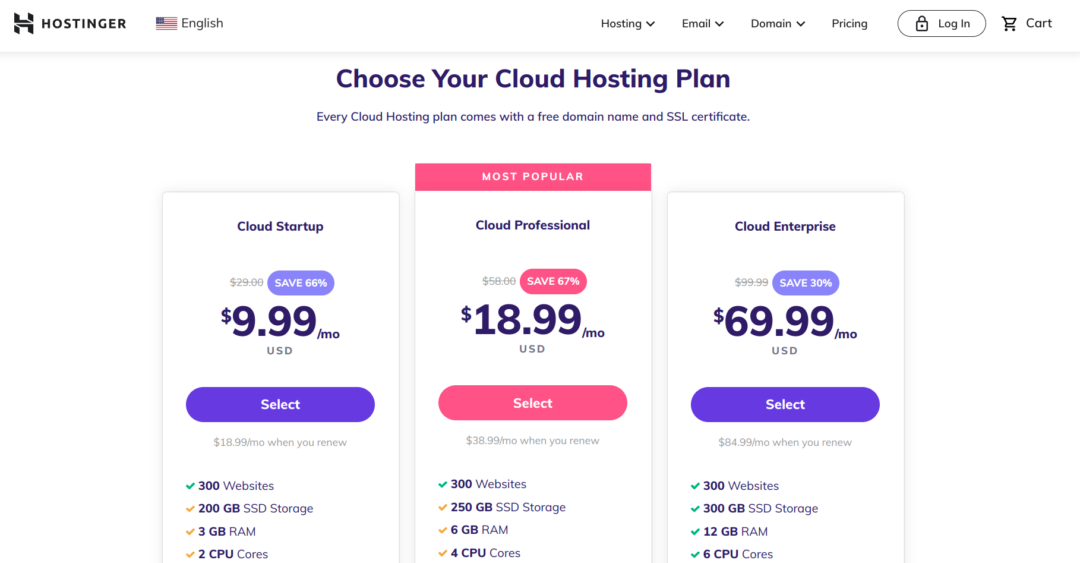
Currently, there are three plans:
- Cloud Startup: 3GB memory, 2CPU, 200GB storage, $29/mo (month-to-month), $9.99/mo (48-month)
- Professional: 6GB memory, 4CPU, 250GB storage, $58/mo (month-to-month), $18.99/mo (48-month)
- Enterprise: 12GB memory, 6CPU, 300GB storage, $99.99/mo (month-to-month), $69.99/mo (48-month)
Huge discounts are available if you go for the 48-month billing cycle.
All the plans come with fully managed Linux servers that run on the CloudLinux operating system with LVE containers.
Seven server locations are available to choose from:
- India
- Singapore
- UK
- Lithuania
- Netherlands
- USA
- Brazil
Apart from the cloud VPS machines, Hostinger also offers normal VPS hosting, which can confuse some of you. According to their FAQ page, the main difference is that the cloud VPS machines do not give root access while the normal VPS machines do that.
Instead of using third-party control panels like cPanel or Plesk, Hostinger offers a custom-developed control panel, which they call hPanel.
Speaking of features there are a lot. The important ones are:
- Cloudflare integration
- Daily backups
- WordPress-specific features
- Free domain
Managed WordPress Hosting on Cloud
6. Kinsta
Founded in 2013 and based in the USA, Kinsta is another company that relies on the Google Cloud Platform to offer managed WordPress hosting solutions.

Since it uses Google Cloud Kinsta is able to offer over 25 server locations around the world.
Expert WordPress support and an easy-to-use dashboard (MyKinsta) are the highlights of Kinsta. It also offers a lot of WordPress-specific features, in addition to a built-in CDN and staging environment.
Coming to the pricing, Kinsta offers a total of 10 plans. The lowest is the Starter plan that allows 1 site, 10GB of storage, and costs $30 per month. And highest is the Enterprise 4 plan, which is capable of hosting a maximum of 150 sites, 250GB of storage, and costs $1500 per month.
See also:
7. WP Engine
Founded in 2010, WP Engine is another managed WordPress hosting that relies on cloud platforms to offer a range of services. Recently, they have also acquired Flywheel – another managed WordPress hosting company.
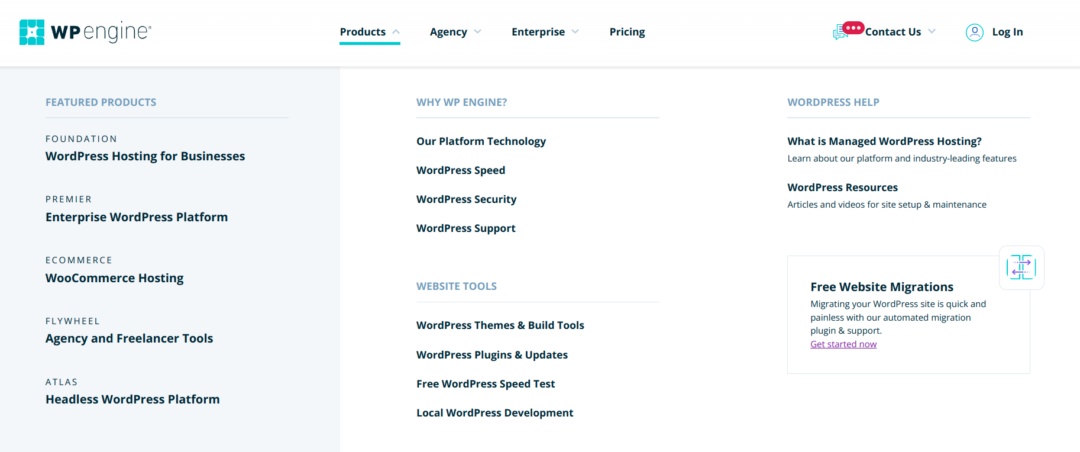
While Kinsta uses the Google Cloud Platform, WPEngine has partnered with both Google Cloud and Amazon Web Services. However, the latter option is only available on their premium plans.
WP Engine has a complex pricing structure with multiple categories and classes of hosting plans.
For instance, under the Foundation category, you can find hosting plans suitable for normal businesses. And under the Premier category, you can find enterprise-grade solutions including headless WordPress (Atlas), and agency solutions.
For someone looking at it for the first time, all these things can be a bit overwhelming.
Based on server resources, WP Engine offers 5 plans:
- Startup: 1 site, 25K visits/mo, starts at $25/mo
- Professional: 3 sites, 75K visits/mo, starts at $49/mo
- Growth: 10 sites. 100K visits/mo, starts at $96/mo
- Scale: more than 30 sites, 400K visits/mo, starts at $242/mo
- Custom
Control Panels
Now let’s have a look at the control panels.
With a normal managed cloud hosting provider, you get both the server and the control panel to manage the websites and applications.
Unlike that, a control panel gives only the user interface. You can log in there, connect to the cloud infrastructure provider, provision servers, and start building websites.
So in short, you end up having two accounts and two billings: one with the control panel itself, and the other with the cloud provider.
Here are some of the things that you can do using a typical VPS control panel:
- Spin up or delete servers on your cloud provider (via API)
- Set up LAMP/LEMP stack
- Install & manage WordPress/PHP sites
- Manage software updates
- Installing & renewing SSL certificates
- Security monitoring
The following are the things I usually check when selecting a control panel for WordPress websites:
- Server software stack: The control panel takes care of installing the necessary software stack when you first connect a fresh VPS server. It can be LAMP, LEMP, LiteSpeed, with varying configurations. The stack you are using can greatly affect the performance of your sites.
- Integrations available with popular cloud providers: GCP, AWS, Linode, etc.
- Pricing: Control panel pricing is usually based on the number of servers you can connect, number of websites you can create, and other such parameters. Based on that, some are good for people with fewer sites while others are better for people managing numerous servers and sites.
8. GridPane
GridPane is probably the most expensive option on this list. And also the most feature-rich. They mainly target developers and agencies who manage a lot of websites.

There are four plans:
- Panel
- Developer
- Agency
- Enterprise
Lowest plan is Panel, which itself costs $50 per month. All the plans allow unlimited servers and sites.
GridPane offers a lot of options when it comes to setting up your server stack. You can choose between Nginx or OpenLiteSpeed. For caching, you have several options: Redis and Nginx FastCGI page caching.
- See also: GridPane Review
9. SpinupWP
SpinupWP is much easier to use when compared to GridPane. The reason is that it has fewer things to configure.
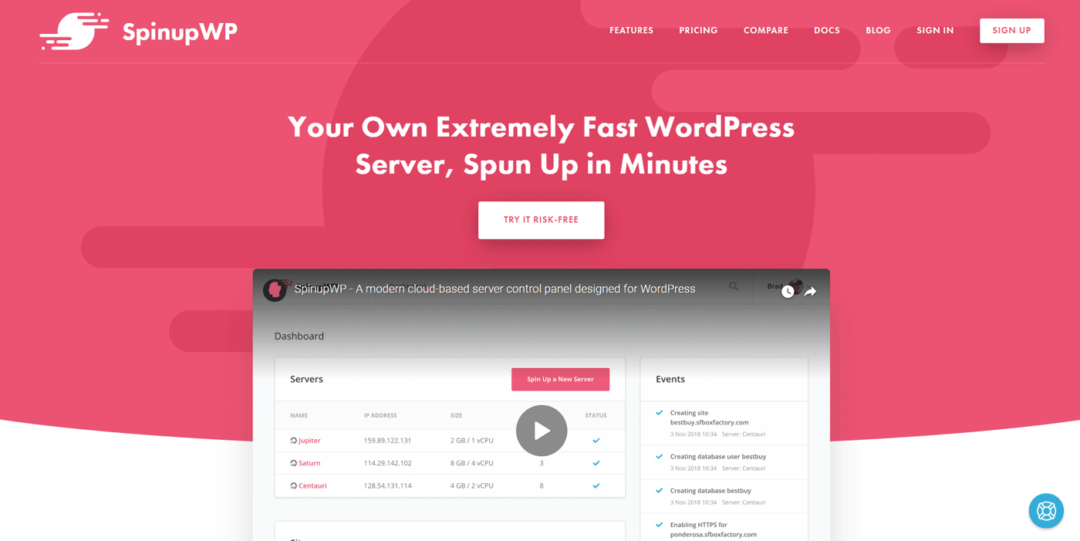
It uses a simplistic yet modern LEMP stack with Ubuntu 20.04, Nginx, MySQL/MariaDB, and PHP. Redis is also available for database and object caching.
There are two plans on offer:
- Personal: 1 server, unlimited sites, $12/mo
- Team: 3 servers, unlimited sites, team features, $39/mo
10. ServerPilot
Launched in 2013, ServerPilot is one of the earliest control panels out there.
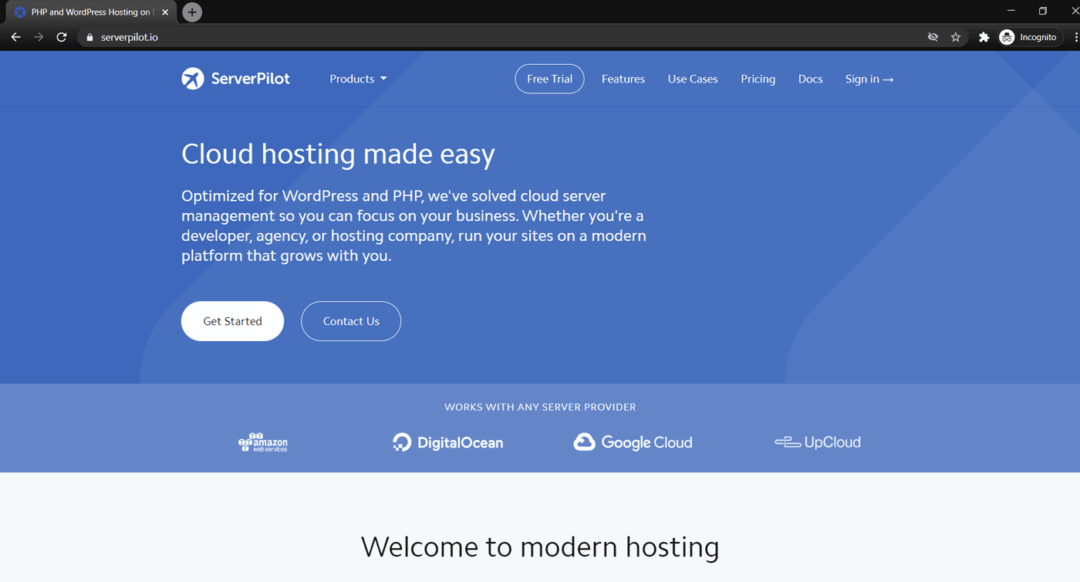
These days you can find that most popular websites replacing Apache with Nginx as the primary web server. It is better in handling concurrent visitors and serving static files.
However, Nginx has its downsides too. Most notably, it does not offer as many configuration options as on Apache. Remember the handy .htaccess files where you put your custom rewrite rules? That’s not possible with Nginx. Also, Apache has its advantages when processing dynamic requests, such as PHP processes.
That might be the reason why ServerPilot uses a combination of both Apache and Nginx. It sits as a reverse proxy in front of Apache and handles the incoming requests.
Moreover, ServerPilot installs custom-built packages rather than using the default Ubuntu repository packages.
However, unlike SpinupWP or Gridpane, ServerPilot is not a WordPress-focused control panel. Instead, it allows you to set up any PHP application.
For the same reason, ServerPilot does not offer any built-in caching mechanisms, which can be thought of as a disadvantage. Caching requirements vary from one type of PHP application to another, so it may not be possible to offer a one-size-fits-all solution. So you have to use a third-party solution like WP Super Cache or WP Rocket.
Coming to the pricing, ServerPilot charges on a per-server and per-application basis. There are three plans: Economy, Business, and First Class.
The lowest is the Economy plan, which costs $5/server and $0.5 for each application installed on it. It can be the cheapest option if you have a single server and one or two applications installed on it. Otherwise, if you want to manage multiple servers, then the total cost can go quite high.
For instance if you have 10 servers, and one website on each of them, then the total cost becomes $55/mo. It is more expensive than GridPane’s starting plan.
11. RunCloud
Launched in 2016, RunCloud is a Malaysian company that allows hosting PHP applications including WordPress websites on cloud providers like DigitalOcean, Linode, and Amazon.

While most of the other control panels offer either Nginx-only or Nginx-Apache reverse proxy, RunCloud offers both:
- Native Nginx
- Nginx-Apache2 Hybrid
In addition to that, there is also an option to install the OpenLiteSpeed web server although that feature is currently in the beta stage.
There are multiple options for caching as well: you can choose either Redis or PHP FastCGI for page caching.
RunCloud also offers a custom WordPress plugin from where you can control the caching-related settings. The plugin is called RunCloud Hub, which includes three things: Runcache plugin for Nginx caching, Redis Object Caching, and Server monitoring.
Another factor that makes RunCloud a great option is pricing. There are three plans and none of them place any limits on the maximum number of applications you can create.
- Basic: 1 server, unlimited apps – $8/mo
- Pro: unlimited servers and apps, 6G/7G firewall, custom Nginx config – $15/mo
- Business: All Pro features, Cloudflare DNS, and team collaboration features
12. Laravel Forge
Forge is another platform where you can set up and manage PHP application servers. It is from the same team that created Laravel – the popular PHP framework.

The platform supports multiple server types, or stacks, such as Application server, Web server, Database server, Cache server, etc.
Out of these types, the Application server installs Nginx, PHP, MySQL/MariaDB/PostgreSQL, Redis, Memcached, and NodeJS.
For installing Laravel or other frameworks, you can connect your GIT repository and ask Forge to install it from there.
The other options available are WordPress and PhpMyAdmin.
Forge offers three plans:
- Hobby: one server, unlimited sites – $12/mo
- Growth: unlimited sites and servers – $19/mo
- Business: unlimited sites and servers with team collaboration features, database backups, and server monitoring – $39/mo
DIY Server Management Tools
Lastly, let me mention some command-line tools as well. The main advantage is that you don’t need to spend any extra money on server management. However, you should be comfortable working from the command line to use these tools.
13. WordOps
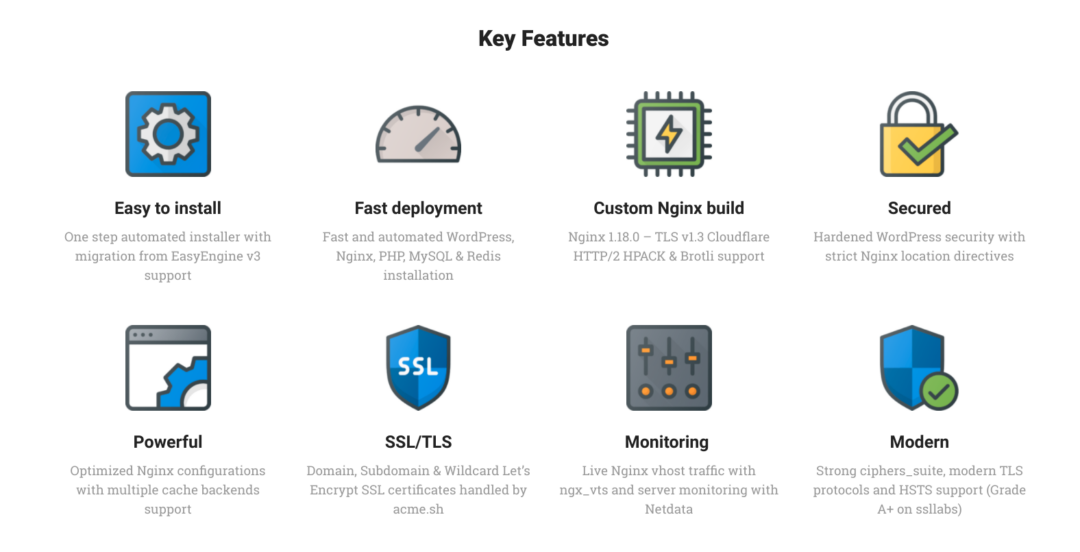
Written in Python, WordOps is an open-source tool that helps set up and manage server stacks using ‘wo’ commands.
For instance, the command:
- wo site create example.com –wpfc
creates a new WordPress site with Nginx FastCGI cache.
Not only WordPress but it also supports static HTML and PHP applications.
WordOps installs a modern stack with Nginx, PHP, MySQL, and Redis cache, along with the caching plugin of your choice.
14. Slickstack
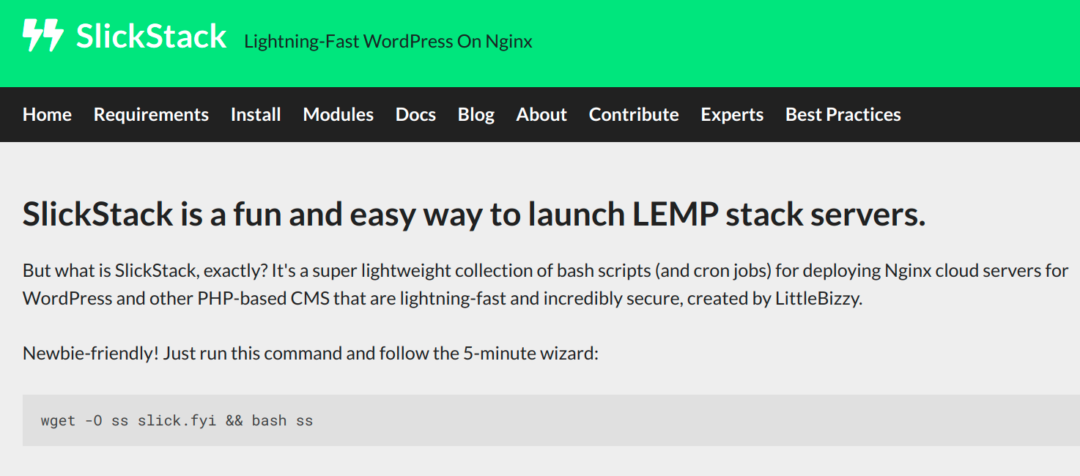
Slickstack is a tool that is completely written in Bash script. Just like WordOps, it also installs WordPress on a LEMP stack with Redis cache.
15. EasyEngine
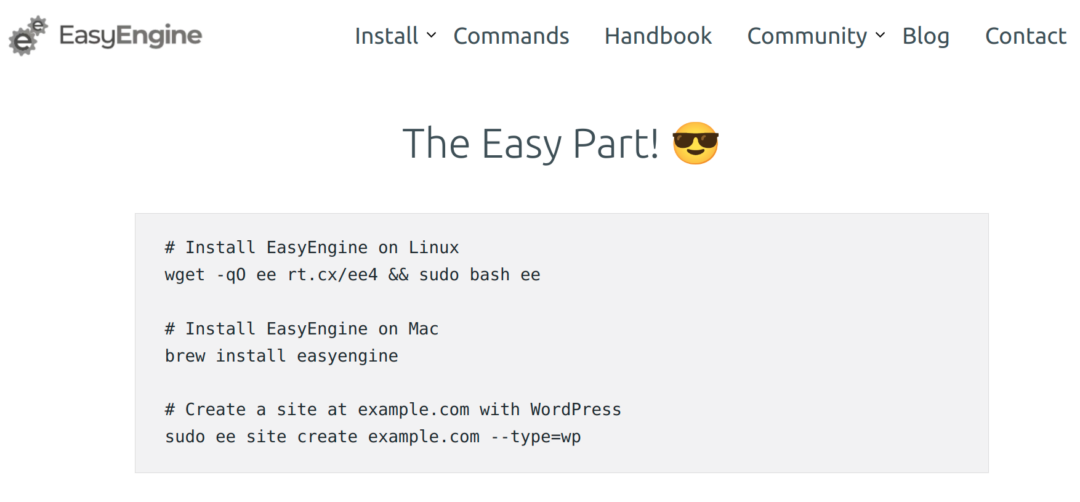
EasyEngine is primarily written in the PHP programming language. Just like WordOps, it allows you to install WordPress, PHP, or HTML websites. In fact, WordOps is a fork of EasyEngine.
Conclusion
I hope this post helped you to find an alternative to Cloudways.




